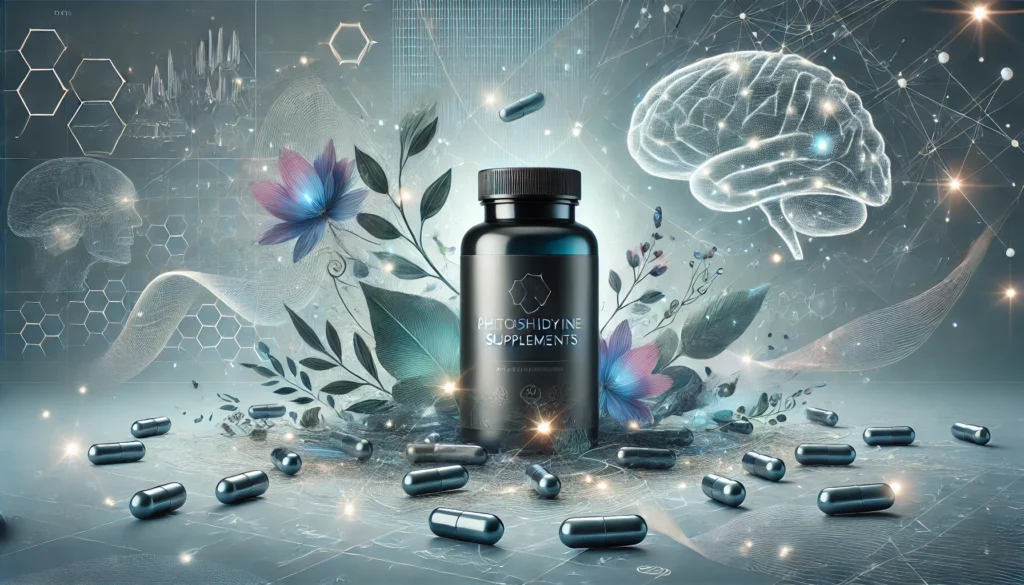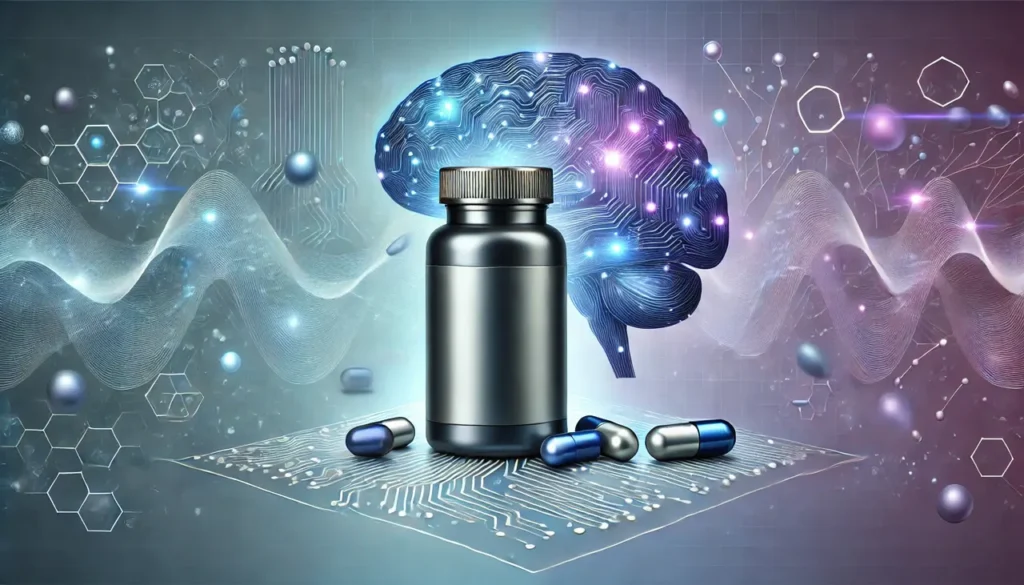Phosphatidylserine is a phospholipid found in cell membranes, particularly abundant in the brain, where it plays a critical role in cognitive function and neuronal health. As a nootropic, phosphatidylserine has garnered attention for its potential to enhance memory, focus, and overall brain performance. This article delves into phosphatidylserine’s origin, its unique chemistry and role in the body and brain, potential cognitive benefits, recommended dosages, possible side effects, and considerations regarding interactions with other supplements and medications. The article further discusses specific safety concerns, particularly for individuals with existing health conditions.
You May Also Like:
St. John’s Wort: Benefits, Dosage, Side Effects, Drug Interactions, And Other Important Information
Sources of Phosphatidylserine
Phosphatidylserine is naturally present in some foods, though the quantities tend to be low. Dietary sources include:
- Animal-based foods: Organ meats (such as liver and kidney), eggs, and certain types of fish, like mackerel, are rich in phosphatidylserine.
- Plant-based foods: Soybeans, white beans, and some nuts and seeds, though these contain phosphatidylserine in smaller amounts compared to animal products.
While these foods contain trace amounts of phosphatidylserine, supplementation is often recommended to achieve levels potentially beneficial for cognitive health. Initially derived from bovine brain tissue, most phosphatidylserine supplements now use soy or sunflower lecithin sources due to safety concerns.
Boost Cognitive Performance and Brain Health with Trusted Nootropics Supplements—Buy Now on Amazon!

Chemistry of Phosphatidylserine
Phosphatidylserine is a phospholipid, a type of lipid that contains a glycerol backbone attached to two fatty acids and a phosphate group. The phosphate group in phosphatidylserine is connected to a serine molecule, which contributes to its specific physiological actions. This unique structure allows phosphatidylserine to be a critical component of cell membranes, particularly in neurons where it influences fluidity, signaling, and the regulation of cellular processes.
In the brain, phosphatidylserine supports the integrity of neuronal membranes, enabling efficient signal transmission across synapses. It is involved in the synthesis and release of neurotransmitters such as acetylcholine, dopamine, and serotonin, which are crucial for memory, mood, and cognitive function.

Physiological Mechanisms of Phosphatidylserine in the Body and Brain
Phosphatidylserine primarily operates within cell membranes, where it helps maintain structural integrity and fluidity. This structural role is essential for:
- Signal Transmission: Phosphatidylserine contributes to the creation of an electrochemical gradient across the membrane, facilitating effective communication between neurons. This process is crucial for cognitive functions, including attention, learning, and memory.
- Neurotransmitter Release: Phosphatidylserine assists in the release and regulation of neurotransmitters, which directly impact mood and cognitive processes. Its influence on neurotransmitter activity underpins its nootropic potential, as adequate neurotransmitter levels are associated with improved memory, concentration, and mental clarity.
- Neuroprotection: As an antioxidant, phosphatidylserine helps mitigate oxidative stress, protecting neurons from damage and potentially slowing cognitive decline. This is particularly relevant in aging brains, where oxidative damage is a significant contributor to neurodegenerative conditions.
Support Memory and Mental Sharpness with Trusted Potassium Supplements—Order Now on Amazon!

Nootropic Benefits of Phosphatidylserine
Phosphatidylserine’s role in supporting neuronal health and cognitive function makes it an attractive candidate for nootropic applications. Below are some of the most researched nootropic benefits:
- Memory Enhancement: Studies indicate that phosphatidylserine supplementation may improve memory in older adults experiencing cognitive decline. This benefit appears to stem from phosphatidylserine’s support for neuronal signaling and neurotransmitter activity, which are critical for encoding and retrieving memories.
- Increased Focus and Mental Clarity: By promoting neurotransmitter release and cell membrane integrity, phosphatidylserine may enhance focus and clarity, especially under stressful or mentally demanding conditions. This benefit has been observed in both young adults and older individuals.
- Stress Reduction: Phosphatidylserine influences the hypothalamic-pituitary-adrenal (HPA) axis, which regulates the body’s response to stress. Some studies show that phosphatidylserine may reduce cortisol levels, thereby diminishing the physical and psychological effects of stress. This aspect is beneficial for both cognitive performance and general mental well-being.
- Enhanced Athletic Performance and Recovery: The reduction of cortisol levels, combined with phosphatidylserine’s effect on mental focus, has led to its use among athletes for improved performance and recovery. By modulating the stress response, phosphatidylserine may aid in reducing exercise-induced stress and hasten recovery.
- Improved Mood and Emotional Resilience: Phosphatidylserine may have positive effects on mood and emotional stability by regulating neurotransmitter levels and enhancing communication between neurons. Some studies have suggested that supplementation could help alleviate symptoms of anxiety and depression, leading to a more balanced emotional state and increased resilience to stressors.
- Enhanced Cognitive Processing Speed: Research indicates that phosphatidylserine may improve cognitive processing speed, allowing individuals to think and react more quickly. This benefit is particularly relevant in situations requiring rapid decision-making or multitasking, contributing to overall cognitive efficiency.
- Support for Healthy Aging: As a neuroprotective agent, phosphatidylserine may play a role in slowing cognitive decline associated with aging. Some studies have shown that regular supplementation can help maintain cognitive function in older adults, reducing the risk of age-related neurodegenerative conditions such as Alzheimer’s disease.
- Improved Sleep Quality: Phosphatidylserine may promote better sleep quality by helping to regulate cortisol levels and supporting the body’s natural sleep-wake cycles. Improved sleep can enhance cognitive function, mood, and overall well-being, making phosphatidylserine a valuable supplement for individuals struggling with sleep disturbances.

Dosage and Supplementation Guidelines
The optimal phosphatidylserine dosage depends on the desired effects and individual factors such as age and health status. Here are general guidelines based on current research:
- Cognitive Support Dosage: For cognitive benefits, a common dosage range is 100-300 mg per day, often divided into multiple doses to enhance absorption and efficacy. Studies have found this dosage effective for improving memory, focus, and general cognitive performance in older adults.
- Stress Reduction Dosage: To achieve cortisol-lowering effects and manage stress, 200-400 mg per day, taken before a stressful event or as a split dosage, has been shown to reduce stress markers in some studies.
- Forms of Phosphatidylserine: Phosphatidylserine is typically available in capsule form derived from soy or sunflower lecithin. Both sources are effective, though individuals with soy allergies may prefer sunflower-derived phosphatidylserine.
It is essential to consult a healthcare provider before beginning phosphatidylserine supplementation, particularly for individuals on medications or those with health conditions.
Recharge Your Mind and Enhance Focus with Premium Rhodiola Rosea—Shop Now on Amazon!

Side Effects and Safety
Phosphatidylserine is generally well-tolerated, especially at recommended doses. However, some individuals may experience mild side effects, especially at higher dosages:
- Digestive Upset: Some users report digestive discomfort, including bloating, nausea, or gas, particularly when taking larger doses.
- Insomnia: Higher doses may lead to mild sleep disturbances or insomnia. For this reason, phosphatidylserine is typically taken earlier in the day.
As a phospholipid, phosphatidylserine poses minimal risk of toxicity. However, safety studies in pregnant or breastfeeding women are limited, so phosphatidylserine should be used with caution or avoided in these populations.
Interactions with Other Supplements and Medications
Phosphatidylserine may interact with certain medications and supplements, affecting its efficacy and safety. Notable interactions include:
- Anticoagulant and Antiplatelet Drugs: Phosphatidylserine may have mild anticoagulant effects, which could theoretically enhance the effects of blood-thinning medications like warfarin or aspirin. Individuals taking these medications should consult a healthcare provider before using phosphatidylserine to avoid excessive blood thinning.
- Cholinergic Drugs and Nootropics: Phosphatidylserine’s role in neurotransmitter synthesis, particularly acetylcholine, may interact with other cholinergic nootropics, such as acetyl-L-carnitine or Huperzine A. While this can enhance cognitive effects, excessive acetylcholine levels could lead to side effects such as headaches or muscle tension.
- Antidepressants and Anxiety Medications: Phosphatidylserine’s cortisol-lowering effects may influence the efficacy of certain antidepressant or anti-anxiety medications. While this interaction is not fully understood, individuals on these medications should seek medical guidance before beginning supplementation.
- Other Nootropics: Phosphatidylserine can be combined with other nootropics, such as caffeine, L-theanine, or Bacopa monnieri, to potentially enhance cognitive performance. Careful consideration of dosages and individual tolerance is essential, as excessive stimulation may lead to adverse effects such as jitteriness or anxiety.
Risks for Individuals with Certain Health Conditions
While phosphatidylserine is generally safe, individuals with specific health conditions may require additional caution:
- Hypotension (Low Blood Pressure): Phosphatidylserine has mild cortisol-lowering properties, which can indirectly reduce blood pressure. Individuals with hypotension should use phosphatidylserine cautiously to avoid exacerbating low blood pressure symptoms.
- Blood Clotting Disorders: Given its potential mild anticoagulant effects, individuals with clotting disorders or those on blood-thinning medications should approach phosphatidylserine with caution, consulting a healthcare provider before use.
- Kidney and Liver Conditions: Phosphatidylserine metabolism occurs in the liver, and individuals with impaired liver function should use the supplement under medical supervision. Additionally, those with kidney conditions may have altered phosphatidylserine clearance, requiring dosage adjustments.

Conclusion: Phosphatidylserine as a Nootropic Supplement
Phosphatidylserine’s role in supporting brain cell health, neurotransmitter production, and neuroprotection makes it an appealing choice for those interested in cognitive enhancement. Studies suggest that phosphatidylserine may improve memory, focus, and stress management while also showing potential benefits for athletic performance and recovery. However, despite its promise, phosphatidylserine supplementation should be approached thoughtfully, considering potential interactions with medications, individual health factors, and the absence of long-term safety data.
As research progresses, phosphatidylserine may become a mainstream choice in the field of nootropics and cognitive enhancement. For those considering phosphatidylserine, consulting a healthcare professional is vital to ensure appropriate use and maximize its benefits while minimizing potential risks.

References:
- Phosphatidylserine. Retrieved from: https://my.clevelandclinic.org/health/drugs/25129-phosphatidylserine
- Metabolism and functions of phosphatidylserine. Retrieved from: https://www.sciencedirect.com/science/article/abs/pii/S0163782705000214
- The Mental Health Benefits of Phosphatidylserine. Retrieved from: https://www.verywellmind.com/the-benefits-of-phosphatidylserine-89496
- Phosphatidylserine and the human brain. Retrieved from: https://pubmed.ncbi.nlm.nih.gov/25933483/
- What Is Phosphatidylserine? (Top 6 Benefits & How to Use It). Retrieved from: https://draxe.com/nutrition/phosphatidylserine/
Important Note: The information contained in this article is for general informational purposes only, and should not be construed as health or medical advice, nor is it intended to diagnose, prevent, treat, or cure any disease or health condition. Before embarking on any diet, fitness regimen, or program of nutritional supplementation, it is advisable to consult your healthcare professional in order to determine its safety and probable efficacy in terms of your individual state of health.
Regarding Nutritional Supplements Or Other Non-Prescription Health Products: If any nutritional supplements or other non-prescription health products are mentioned in the foregoing article, any claims or statements made about them have not been evaluated by the U.S. Food and Drug Administration, and such nutritional supplements or other health products are not intended to diagnose, treat, cure, or prevent any disease.


